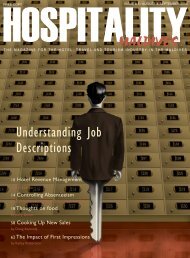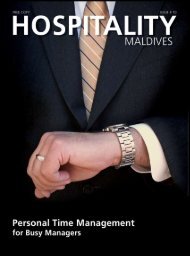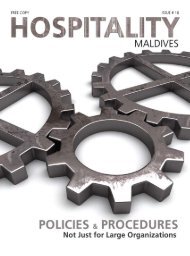Untitled - Hospitality Maldives
Untitled - Hospitality Maldives
Untitled - Hospitality Maldives
You also want an ePaper? Increase the reach of your titles
YUMPU automatically turns print PDFs into web optimized ePapers that Google loves.
“If We Fail To Plan We Plan To Fail.”<br />
The assessment of organizational training and<br />
developmental needs can drive bottom line.<br />
This is achieved by integrating and aligning<br />
the sectional (departmental) objectives with<br />
that of the core business objective. The areas<br />
where training and development intervention<br />
is identified and planned for the future course<br />
of action requires all leaders to acknowledge<br />
the need and develop a multi functional task<br />
force to drive organizational effectiveness.<br />
Hence training needs assessments are carried<br />
out in organizations by Quality assurance<br />
leaders in participation with team leaders and<br />
the employee needs – The “gap analysis”.<br />
The Training And Development Needs<br />
Assessment<br />
This ambitious exercise seldom backfires<br />
with the lack of vision, proactiveness and<br />
follow-up. Training is a learning experience<br />
that seeks a relatively permanent change in<br />
an individual that will improve his/ her ability<br />
to perform on the job. It involves changing of<br />
skills, attitudes and knowledge. Development<br />
is more future oriented and more concerned<br />
with education than training. Management<br />
Development activities attempt to instill sound<br />
reasoning processes to enhance one’s ability<br />
to understand and interpret knowledge. It<br />
focuses on the personal growth and also on<br />
Analytical, Conceptual and Human skills.<br />
The keys to needs assessment are:<br />
• Review of previous training plan.<br />
• Quality Circles / Thinking councils.<br />
• Performance Reviews – Departmental &<br />
Organizational<br />
• Business plan – Both Macro and Micro<br />
• Guest Comments<br />
• Audit Reports and Results<br />
• Succession Planning tool<br />
• Department training review results<br />
• Departmental goals<br />
• Department budgets<br />
• Individual’s learning need<br />
(Conscious In competency)<br />
• Employee evaluation result<br />
(Unconscious In competency)<br />
• Business plan of the organization<br />
• New Technology / Process<br />
• Corporate priorities<br />
• Diversity and Inclusion<br />
The Diversity Issue In Training<br />
Diversity is about differences, while inclusion<br />
is about managing those differences.<br />
Training is to facilitate a unique environment<br />
where everyone can be fully participating<br />
members of the environment. There’s also an<br />
individual focus in creating an organization<br />
or an environment where all people have the<br />
opportunity to fully engage, as diversity is<br />
integrated into key business processes.<br />
The <strong>Maldives</strong> is now predominantly a service<br />
and knowledge economy. As a consequence of<br />
globalization and the multinational character<br />
of the tourism industry, today’s workforce<br />
is often international in the resort and spa<br />
business, resulting in an increased need<br />
to manage workplace diversity. The ability<br />
to take advantage of a diverse employee<br />
population can mean the difference between<br />
success and failure in today’s business<br />
world.<br />
Managing diversity in the increasingly<br />
international workplace with multi cultural<br />
and multi ethnic groups has never before<br />
been such an integral part of cultivating<br />
competitiveness. This issue does not end<br />
with employees; so are consumers even<br />
more diverse. The background of customer<br />
groups has changed as we are in a Multimillion<br />
dollar service Industry in the <strong>Maldives</strong><br />
contributing to a major GDP to national<br />
economy.<br />
In fact, we should not only measure and track<br />
diversity statistics (all facets of diversity -<br />
gender, disability, age, and visible minorities),<br />
but the managements should also be<br />
accountable to ensure that our population is<br />
as inclusive as possible and is representative<br />
of the demographics of our multi-faceted<br />
Maldivian resort employees. The key point<br />
here is that we have created a positive work<br />
environment through our programs, hiring<br />
practices and recognition that being different<br />
is something to be accessed, planned and<br />
celebrated.<br />
Jorely Mathew BHM, CHE, Training Manager, Soneva Gili by Six Senses, Republic of <strong>Maldives</strong>
















